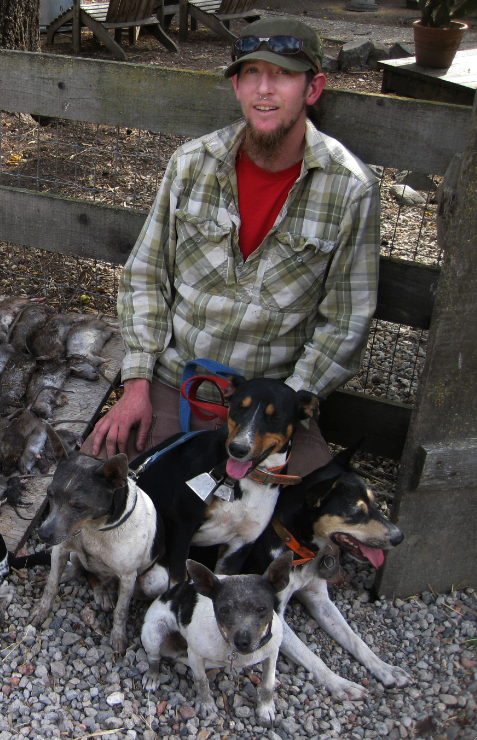Jordan Reed and his terriers send the rats packing.
A lot of people are very embarrassed that they have a rat problem,” Jordan Reed says. “So, anonymity is a big thing.”
But, Reed will also tell you, if you have a home chicken coop, particularly one with its floor on the ground and insulated walls, it’s really only a matter of time before you will have something to be embarrassed about.
“Working with small homestead farmers,” Reed says, “I discovered a serious problem with raising poultry, which is that, no matter what you do, you’re always going to have rats.”
Reed’s solution is time-honored: Bring on the rat terriers. And while his solution might be old, it couldn’t be more timely, as California has passed a new law banning home use of anticoagulant rat poison effective July 1.
The problem with the poison is that it takes days for the rat to die and the animal metabolizes it poorly. Therefore, the rodent is still full of poison when it is eaten by another animal—which then also dies.
Saying that he is “the only terrier-pack-for-hire that I know of in the United States,” Reed believes that using his Feist breed of terriers is a far more humane and ecologically sound method of rodent eradication. Better than cats—mostly because the Norway rat predominant in our area is too big for a mere cat to kill.
“No cat is going to catch a rat that big,” Reed says. “They do significant damage even to the dogs. Cats play with safe prey that they can dispatch quickly. A barn cat will help with juvenile rats and keeping breeding under control, but cats can’t help with real rat problems.”
Reed, 33, is a South Carolina native who came to California to skill himself in traditional homesteading. He works as a cellar assistant at Marimar Estate and lives onsite, which allows plenty of room for his four dogs, which he affectionately calls the “Mongrol (sic) Hoard,” to roam. He will gladly take a case of beer for his work or accept the odd box of meat from a CSA. If he did charge for his efforts, he reckons it would cost between $25-$50, but he’s not interested in tangling with the IRS, so prefers to trade his skills.
“Most of this has been word-of-mouth,” he says of the nearly endless requests he’s currently receiving. “I’m confident enough now to replicate this at location after location. We’re going to farms, typically, with 25 or more chickens. People who have had chickens for a couple of years, they’re feeding kitchen scraps, they’re free-feeding their chickens, and two years later, they’ve collected quite a collection of rats who are living off of their poultry operation. Once they start seeing rats, they contact me.”
But he admits that he can’t solve every pest problem.
“I’ve gone to plenty of places where I can’t catch rats,” Reed says. “If they’re in the walls, I can’t catch them. If you build your chicken coop on the ground on the floor like a house, I can’t catch them.”
In other words, if your chickens live as well as you do, your rats are your doing.
Perhaps most importantly to him, Reed emphasizes that his Feist terriers are not pets, nor does he breed or sell them. They are co-workers, and his admiration for the animals is clear.
A good dog can never be replaced, can never be repurchased, and can never be retrained. Jordan Reed
“These are dogs that live in kennels when they’re not working,” he emphasizes. “These are not pet dogs. They can’t be in your house. You don’t play with them as puppies. You exercise them. The kinds of dogs that can consistently produce the kinds of results I need are not good pets.”
That said, his feeling is one of honor for his terriers.
“Any real working dog at any given point in its life would be willing to give up its life on the line for its job,” Reed says. “They’re way more valuable than a pet. A good dog can never be replaced, can never be repurchased, and can never be retrained.”
And make no mistake—Reed doesn’t have some weird love of rats or the kill.
“Rats stink,” he says flatly. “They’re gross. If you leave them to decompose, they leave grease marks. One thing that’s very scary to people like me is that people think that we’re like Michael Vick. A lot of people think that I get off on blood. Rats are only one thing I do, but that’s the only thing I’m willing to talk about.”
Reed hunts, though he’s foresworn bow-hunting as being inhumane given that clean killing with rifles is available. He tries to live off the grid as much as possible. He views himself through the lens of another era.
“The old-fashioned woodsman is a bygone archetype,” he says. “People say, ‘I’m a bow hunter who only hunts for deer’ or ‘I’m an elk hunter who pays for hunts in Colorado.’ It’s not, ‘I have a homestead farm and I have the skills to deal with the native environment to survive.’ I see myself as a bridge between those worlds. I’m very interested in traditional methods, and the hunting with dogs and rat control is only part of that.
“I’m not interested in killing things,” he says. “I really care about skills being lost that, in order to be regained, will take us the same amount of time to learn as it did the first time.”

